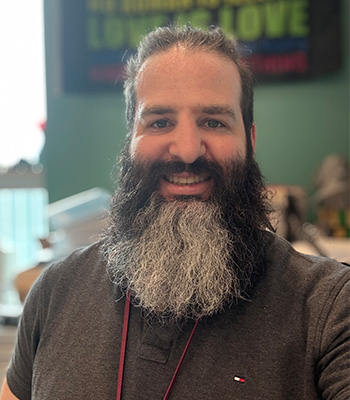The EPICS K-12 Program is a leader in developing, disseminating and supporting service learning models that engage students in engineering and computing-based design projects that meet the needs of their communities.
Featured EPICS K-12 Teacher
“In the EPICS program, students learn to use a range of design software and fabrication tools — including vinyl cutters, laser cutters, 3D printers and CNC routers — to create real-world projects for clients such as teachers, staff, parents and community members." — Joseph Page

Joseph Page earned his Bachelor of Science degree in neuroscience with a minor in psychology from the University of Minnesota–Twin Cities (2007). He went on to attend Rush Medical College as an MD candidate from 2007-2010 before discovering his passion for education. In 2011, he transitioned into teaching through Northwestern University’s NUTEACH program, where he earned his teaching license. He later completed a Master of Arts in Literacy Education at Northeastern Illinois University in 2017.
For the past 15 years, Page has been an educator at John Hancock College Preparatory High School, where he has taught biology, anatomy and physiology, chemistry, AP chemistry, EPICS and adaptive EPICS. Around 2015, he received a major grant from the James Dyson Foundation to establish and equip the school’s makerspace, followed by training through Purdue University’s EPICS program to launch Hancock’s EPICS courses.
In the EPICS program, students learn to use a range of design software and fabrication tools — including vinyl cutters, laser cutters, 3D printers and CNC routers — to create real-world projects for clients such as teachers, staff, parents and community members. Through this process, students engage in authentic problem-solving, collaboration and service learning, gaining both technical and professional skills.
The Adaptive EPICS course extends these same principles to include Hancock’s Cluster Students, who require moderate to intensive supports. These students take the lead in maintaining the school’s hydroponic garden towers, from planting and caring for seedlings to harvesting and distributing produce within the school community. The program promotes inclusion, hands-on learning and environmental stewardship while giving all students the opportunity to contribute meaningfully to their school and neighborhood.
Outside the classroom, Page enjoys woodworking, gardening, farming and making maple syrup with his wife and their four sons. His approach to teaching and life emphasizes creativity, practical application and community connection through science and design.